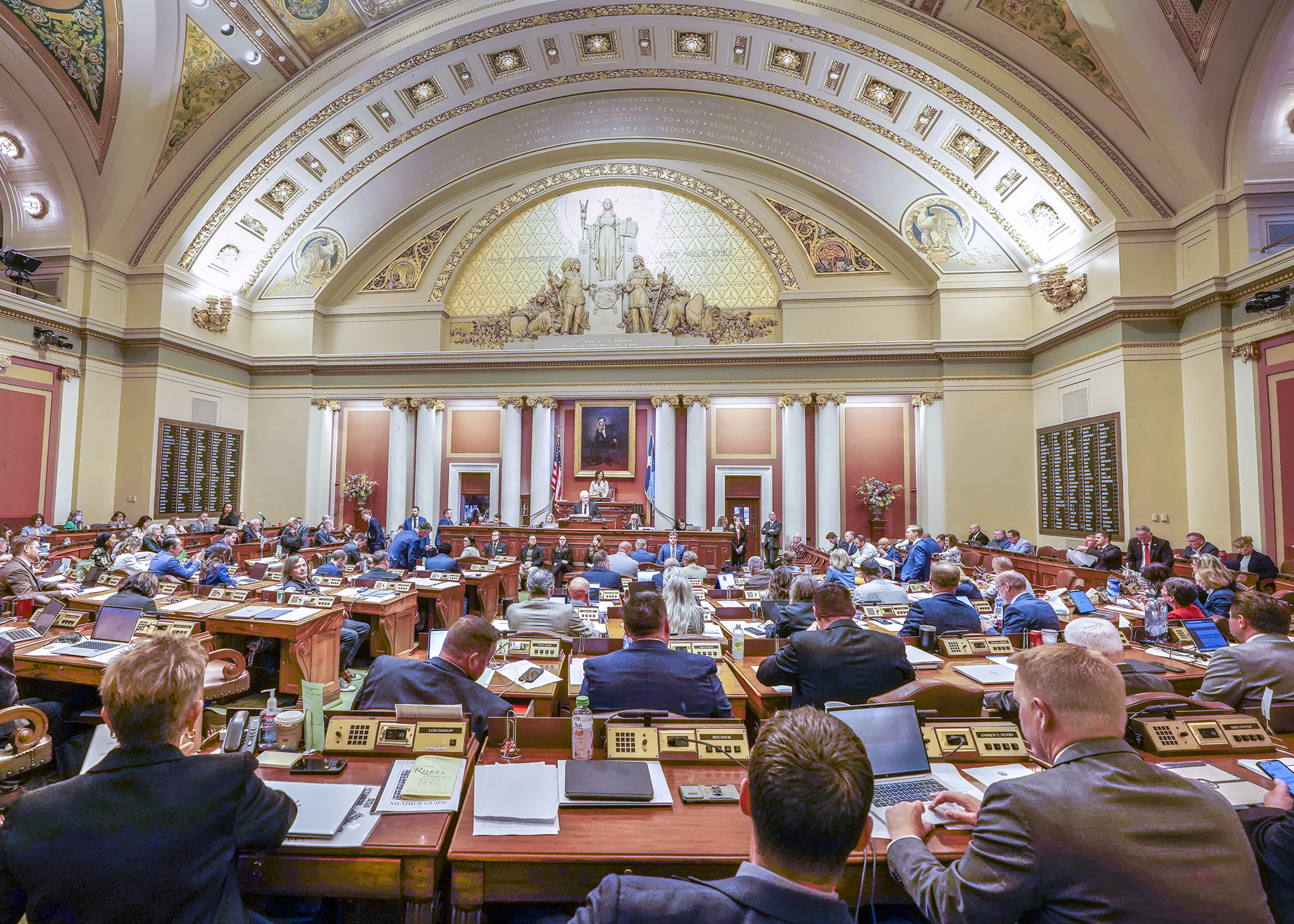House approves omnibus tax bill with increased taxes on cannabis, data centers

Did the pledges by some legislators not to raise taxes this session go to pot?
The chief revenue raiser in the 2025 tax agreement passed by the House Monday is a plan to increase the state’s 10% cannabis gross receipts tax to 15% and repeal local government cannabis aid. According to the Revenue Department, that change could enhance the state’s coffers by $76.5 million in the next biennium.
And that would take care of the bulk of the $118 million in increased revenue for the next biennium (or cuts in previously approved aids and credits) required by an agreement between Gov. Tim Walz and legislative leaders.
In its second-to-last action of the special session, the House passed the omnibus tax bill, SSHF9, by a 93-39 vote, and sent it on to the Senate. It meets that $118 million requirement primarily through a combination of the increased cannabis gross receipts tax and eliminating a tax exemption for electricity use by data centers.
Technology companies that run such centers currently pay no taxes on electricity or purchases of equipment and software, but it’s projected that taxing its electricity use would increase state revenue by $56.25 million in the 2026-27 biennium.
And there’s one other revenue raiser in the bill: Beginning in June 2027, accelerated payments of June sales tax liabilities would be re-instituted at a rate of 5.6% for large retailers. That’s projected to result in $22.82 million in increased revenue in the next biennium.
The bill also includes one significant tax cut. The state’s research and development tax credit would become partially refundable at a rate of 19.2% through tax year 2025 and 25% in 2026 and 2027. It’s estimated that this would result in the state’s businesses having their taxes reduced by a cumulative $40.3 million in the 2026-27 biennium.
“We did not cut local government aid at all,” said Rep. Greg Davids (R-Preston). “We did not cut county program aid. The governor’s bill and the Senate’s had some pretty substantial cuts to those programs. This bill does not. We did not cut PILT, payments in lieu of taxes.”
With a deficit looming in the fiscal year 2028-29 biennium, the working group was also assigned the task of finding more revenue during those years, with a target of $190 million. Projections say that would be achieved by revenue growing to $135.8 million from the changes in the cannabis gross receipts tax, the data center electricity tax bringing in $82.7 million, and a 50% reduction in aquatic invasive species prevention aid adding $9.7 million to the General Fund.
Also enhancing revenues for the 2028-29 biennium would be a change in the sustainable forestry incentive payments program that would reduce the per-acre payment by 10%, beginning with payments in calendar year 2027. That’s expected to increase revenue by $3.77 million in that biennium.
[MORE: View the spreadsheet]
Tax policy changes
Among several policy provisions in the bill are measures that would:
- allow property to qualify for the agricultural property tax classification if it is used to produce floriculture products;
- allow local units of government to abate property taxes on property that will be used for the development of affordable housing and on property that is held by a land bank organization for future development;
- extend the deadline for temporary tax increment financing authority for the cities of Bloomington, Edina, Maple Grove, Marshall, Minnetonka, Moorhead, Oakdale, Ramsey, St. Cloud and St. Paul;
- establish or expand tax increment financing authority for the cities of Brooklyn Center, Brooklyn Park, Eden Prairie, Maplewood, Plymouth and St. Cloud;
- create and fund a consumer protection restitution account for victims of fraud;
- raise the State Agricultural Society’s debt limit for state fair bonds to $50 million;
- require rental property owners, agents and manufactured home park owners to provide certificates of rent paid to renters; and
- limit the sustainable aviation fuels sales tax exemption to materials, supplies and equipment purchased after June 30, 2027, and before July 1, 2034.
Legislators respond
“While I don’t believe that this bill does enough to help people, I’m sure that my colleagues across the aisle believe that it doesn’t help corporations enough,” said Rep. Esther Agbaje (DFL-Mpls). “That’s the nature of compromise.”
“The increase in the cannabis tax is not a good idea for a market that’s just getting started,” said Rep. Nolan West (R-Blaine).
“A tax bill can be a way to express our values, a way to contribute to the public good,” said Rep. Aisha Gomez (DFL-Mpls), co-chair of the House Taxes Committee. “By the metric of: Is this a tax bill that provides giveaways to the people with the best lobbyists? This is a pretty good tax bill.”
Related Articles
Search Session Daily
Advanced Search OptionsPriority Dailies
Legislative leaders set 2026 committee deadlines
By Lisa Kaczke Legislative leaders on Tuesday officially set the timeline for getting bills through the committee process during the upcoming 2026 session.
Here are the three deadlines for...
Legislative leaders on Tuesday officially set the timeline for getting bills through the committee process during the upcoming 2026 session.
Here are the three deadlines for...